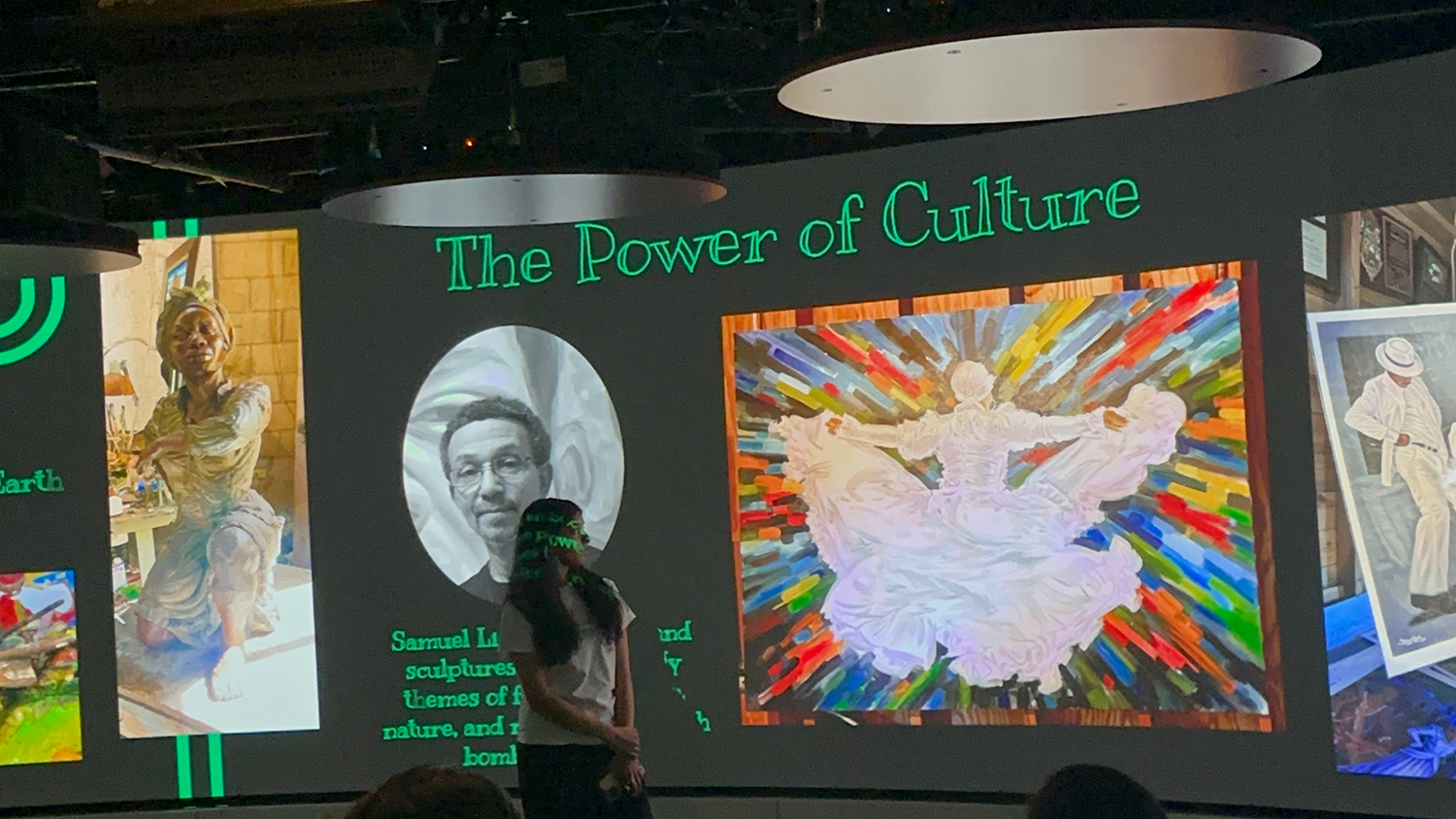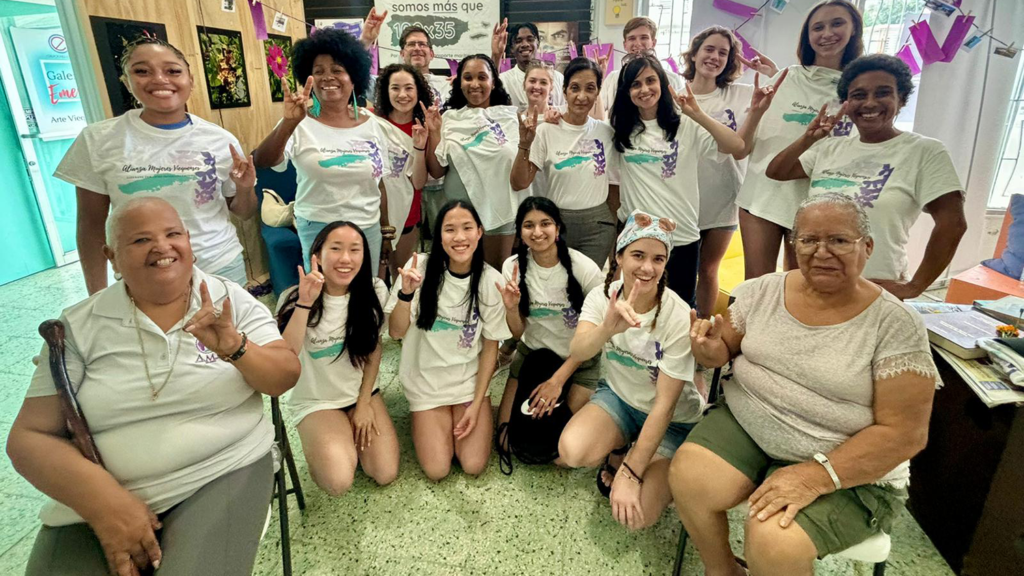Honors Seminars In Action: ‘Puerto Rico After Maria’

The University Honors Program (UHP) strives to develop global citizens, connecting students with communities both local and beyond. In the Spring of 2024, Maru Gonzalez partnered with the UHP to combine travel with a thought-provoking Honors Seminar that encouraged students to embrace advocacy and growth mindsets.
A section of HON 398, the Honors Program’s “Special Topics” course shell, entitled “Puerto Rico After Maria,” introduced students to the struggles that the people of Puerto Rico have overcome since Hurricane Maria hit the Caribbean in September of 2017, efforts to restore parts of the island, and how the students could contribute to these efforts as responsible global citizens.
“Puerto Rico After Maria” provided students with an opportunity to learn about the history and culture of Puerto Rico, a U.S. territory island in the Caribbean, which they had the privilege of traveling to for spring break in 2024. With a focus on the effects that Hurricane Maria had on the island, the course highlighted the history between Puerto Rico and the U.S. Government, the social and political effects of colonization and post-Maria recovery and sustainability efforts.
To prepare for their spring break immersion, students were introduced to agricultural, social, economic and political issues that currently face and have previously faced the citizens of Puerto Rico.
They learned about these topics by examining texts being published from the area in a seminar environment, where grades were evaluated based not upon test scores, but rather on the quality of an individual’s contributions to the group’s discussions and their ability to actively listen and respond to their peers’ perspectives.
After all, a major goal for this trip was for students to expand their worldview and truly appreciate the experiences of others. This preparation enabled students to fully immerse themselves upon arriving in Puerto Rico, where they volunteered with local groups that work to promote prosperity for the island, especially following the devastation of that hurricane.
Since making landfall in 2017, the effects of Hurricane Maria have yet to be mitigated for many Puerto Ricans. When the storm struck 7 years ago, it did so as a category 4 storm with unprecedented 155 mph winds that were accompanied by flooding, flying debris, and resulted in 100% of the island losing electricity, as well as many losing access to clean water. For years thereafter, the residents of Puerto Rico have suffered a massive humanitarian crisis, as well as a record-setting $94.4 billion in damages.
Eighty percent of the island’s agriculture was destroyed, which was devastating for a government that was already attempting to support a population in which nearly half of the community suffers from poverty. Emigration became a reality for 130,000 of the island’s 3.4 million residents, furthering its decade-long economic recession.
The recession was only worsened by the COVID-19 pandemic, which drained the island of tourism income and coincided with unrepaired infrastructure from Maria that fueled many humanitarian crises, especially in terms of the residents’ ability to access adequate healthcare and social services. The pandemic, in addition to a 6.4 magnitude earthquake in August of 2020, made it even more difficult for people to recover from what feels like a never-ending series of disasters.
Course instructors Ken Johnson, UHP associate director, and Maru Gonzalez, Department of Agricultural and Human Sciences, crafted “Puerto Rico After Maria” to be a course that educated students about Puerto Rican culture, adversity faced and overcome, and how the students could help.
Gonzalez shared, “We didn’t want the trip to be simply zip lining and beach trips. We really wanted it to be a learning experience. We wanted there to be a component of community engagement for students to really get a sense of what the culture is like there, what the challenges are, what challenges Puerto Ricans are experiencing and what people across the archipelago are doing to build a more sustainable and equitable future for Puerto Ricans.”
While this intentionality was certainly seen in the community engagement work that students contributed to upon arriving in Puerto Rico, it also allowed them to build meaningful connections within their cohort. For Jada Strickland, at the time a second year Honors student studying Marketing and a participant in the spring 2024 course, the peers she embarked on this journey with were critical to shaping her experience.
“The community not only within Puerto Rico but within the group of students that went were irreplaceable and so impactful,” she said.

With pre-trip preparation in the classroom and a supportive network of UHP students and staff, many participants sought to think critically about the issues they had been educated about. They identified opportunities to expand their knowledge by engaging with local citizens of the island. Through group service work and finding time to take in the small moments, many participants were able to utilize their experience with “Puerto Rico After Maria” to grow their mindsets and reimagine their roles as advocates. For Noell Boling, at the time of the trip a second year studying biological sciences, reflects that their experience empowered them to speak out and uplift the stories of those who are often overlooked.
“A large piece of this trip and what I can do to support the people I met is spreading awareness,” Boling said. “Before this trip, I had never learned about Puerto Rico. I didn’t understand what its relationship to the U.S. meant, much less the lives and experiences of the people who lived there. While I still have much to learn, I now know the true importance of sharing what I have learned and reframing the way that I and others speak about the United States’ modern colonies. The Women of the Alianza de Mujeres Viequenses aren’t here to tell their own stories, but I can help to give their stories a platform with those I interact with.”
The Women of the Alianza de Mujeres Viequenses (AMV) is an organization founded and spearheaded by a community of women in 1999 to protest America’s military occupation of Puerto Rico. These protests were specifically targeting military testing operations. By bringing their voices together and telling the stories of those adversely affected by the testing, the women were able to present a united front and end the island’s occupation by the U.S. military. Currently, AMV focuses on calling upon women from diverse backgrounds to advocate for the well-being of current and future generations of Puerto Ricans.
Many student participants embraced the idea of advocacy and speaking up for others after having the opportunity to hear directly from native Puerto Ricans. Upon returning home, HON 398 students demonstrated their expanded worldviews, with many sharing personal stories about the connections they made with the locals. Boling made sure to highlight the individuals they got to interact with.
“I was most impacted by meeting and talking with Puerto Ricans about their lives and culture,” Boling said. “We met outstanding people like Glo, our taxi driver, Santiago, our guide at El Josco Bravo and Tito, a documentary filmmaker, activist, author and more who accompanied us on the trip. These and many more people welcomed us to their homes and connected with me through stories of their care for their Puerto Rican home and its culture. Connecting with them was not only a joy, but helped me better understand their life experiences and see how important uplifting the experiences of the Puerto Rican community truly is.”
As Boling mentioned, the spring break trip to Puerto Rico included many opportunities to travel and engage in tourism activities, including visiting Estacion Experimental, a tropical agricultural and biofuel research facility, El Yunque National Forest, La Finca De Hamberto, a small-scale farm focused on creating more sustainable local food systems and El Josco Bravo, a non-profit school focused on educating young people about social, scientific and economic agricultural systems. Students also had the opportunity to go Bomba dancing, listen to live local music and explore Old San Juan. It was spring break, after all.
Undoubtedly transformed by their experiences on the island and the people they had the opportunity to engage with, many “Puerto Rico After Maria” students found a passion for advocacy, which they channeled into action through their final course project after returning to North Carolina, a digital photography exhibit in Hunt Library. For Strickland, the showcase allowed her the opportunity to reflect on cultural issues that continue to harm Puerto Rican communities.
“The digital photography exhibit helped reflect some of the critical issues in Puerto Rico, including the negative impacts of gentrification and over-tourism within the communities,” Strickland said.
Gonzalez described the showcase as an opportunity for students to share what they learned and create empathy within the NC State community.
“They found it beneficial to have this exhibit because it was an opportunity for them to create awareness about what was happening, and give people an opportunity to contribute if they can.”
The students’ digital photography exhibit, as well as additional information about their trip experiences and some of the organizations they worked with and visited, are stored in this student-created LinkTree.
Due to the success of this pilot Honors seminar course plus associated educational trip experience, and the remarkable perspective-changes participating students reported, the UHP continues to offer similar experiential learning opportunities. In the fall of 2024 a small group of students studying “Sustainable Cities and Communities” in an HON 398 section traveled together to Seattle, WA over their fall break to observe urban sustainability practices in action. Their communal class travel blog can be found here.
Another group of students is currently earning honors seminar “course credit” for attending pre-trip preparatory meetings to study post-socialism in Berlin and the Balkans before they travel to Germany and Croatia for spring break to meet with a variety of organizations working on the myriad of social and political challenges these countries are currently facing.
Yet another group is piloting the University Honors Program’s first-ever spring break program offered through the Study Abroad Office. These students are studying the issues confronting the sinking city of Venice firsthand, from both a cultural and a sustainability-minded perspective in HI 343, “Italy: Urban History, Tourism, and Sustainability,” and will spend their spring break experiencing their course come to life right in front of them in the city of canals.
- Categories:


